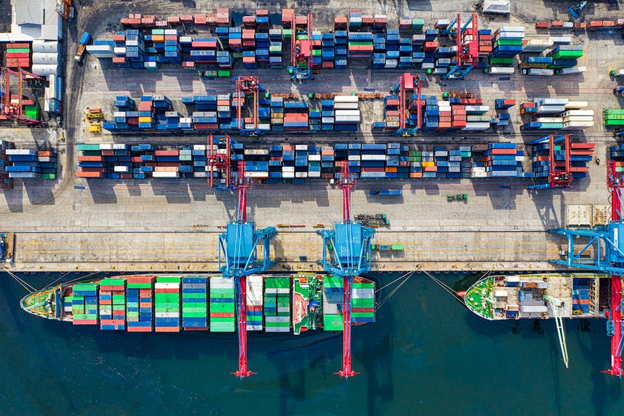In the world of supply chain management, transparency and traceability are essential factors. However, managing supply chains can be a complex and challenging task. That’s where blockchain technology comes in. By leveraging blockchain, supply chain managers can now achieve greater transparency, traceability, and security in their operations. In this article, we’ll explore how blockchain technology is transforming supply chain management and the benefits it brings to the table.
Understanding Blockchain Technology
Before we delve into the impact of blockchain on supply chain management, we need to have a basic understanding of what blockchain technology is.
Blockchain is a distributed, decentralized ledger that records transactions between parties in a secure, transparent, and tamper-proof way. In other words, it creates a shared database that everyone in the network has access to, eliminating the need for intermediaries like banks and other financial institutions.
The technology was initially developed for the cryptocurrency Bitcoin, but it has since been adopted by several other industries, including supply chain management.
What is Blockchain?
Blockchain is a revolutionary technology that has the potential to transform the way we store and share data. It is a digital ledger that is decentralized, meaning that it is not controlled by any single entity. Instead, it is distributed across a network of computers, making it more secure and transparent than traditional databases.
Each block in the blockchain contains a unique code, known as a hash, that is used to verify the authenticity of the data. Once a block is added to the blockchain, it cannot be altered or deleted, making it a tamper-proof record of all the transactions that have taken place.
Key Features of Blockchain Technology
Blockchain has several key features that make it ideal for supply chain management:
- Decentralization: There is no central authority or intermediary in the blockchain network. This means that all parties have equal access to the data, making it more democratic and transparent.
- Transparency: Everyone on the network can see the transactions happening in real-time. This makes it easier to track goods and ensure that they are being transported and stored safely.
- Immutability: Once a transaction is recorded on the blockchain, it cannot be altered or deleted. This makes it a secure and tamper-proof record of all the transactions that have taken place.
- Security: Blockchain uses advanced encryption algorithms to ensure that the data is secure from unauthorized access. This makes it more secure than traditional databases, which are vulnerable to hacking and cyber attacks.
Types of Blockchain Networks
There are three types of blockchain networks: Public, Private, and Consortium. Public blockchains are open to everyone, while private blockchains are permissioned, and only authorized parties can access them. Consortium blockchains are a mixture of both public and private blockchains, where multiple organizations come together to manage the network.
Public blockchains, such as Bitcoin and Ethereum, are open to everyone. This means that anyone can participate in the network and validate transactions. However, this also means that the network is slower and less scalable than private or consortium blockchains.
Private blockchains, on the other hand, are permissioned, meaning that only authorized parties can access them. This makes them more secure and scalable than public blockchains, but also less democratic and transparent.
Consortium blockchains are a mixture of both public and private blockchains. They are managed by multiple organizations, each of which has a stake in the network. This makes them more scalable and secure than public blockchains, while still maintaining some degree of transparency and democracy.
In conclusion, blockchain technology has the potential to revolutionize supply chain management by providing a secure, transparent, and tamper-proof record of all transactions. By eliminating intermediaries and creating a shared database, it can reduce costs, increase efficiency, and improve trust between parties. However, it is important to choose the right type of blockchain network for your needs, as each has its own strengths and weaknesses.

The Current State of Supply Chain Management
The current state of supply chain management is characterized by several challenges, including:
Traditional Supply Chain Challenges
- Fragmented systems and processes
- Limited visibility and traceability
- Unreliable data and information
- Lack of collaboration and trust between parties
The Role of Technology in Supply Chain Management
Technology has played a crucial role in improving supply chain management. However, traditional technologies like ERP systems and EDI have limitations in terms of transparency, traceability, and security, which are critical factors in supply chain management.
The Need for Greater Transparency and Traceability
In recent years, the demand for greater transparency and traceability in supply chain management has increased. Consumers are becoming more conscious of the products they consume and are demanding more information about their origins, environmental impact, and ethical standards. This has put pressure on supply chain managers to be more transparent and accountable.
In the realm of supply chain management, the integration of blockchain technology has ushered in transformative changes. Furthermore, the advent of Quantum AI trading offers a new dimension of growth opportunities. By harnessing the power of quantum computing, Quantum AI trading enables supply chain stakeholders to analyze vast amounts of data, identify inefficiencies, and streamline operations with unparalleled precision.
The combination of blockchain and Quantum AI empowers businesses to enhance transparency, traceability, and trust throughout the supply chain. Embracing this powerful synergy, organizations can unlock the potential to grow with Quantum AI, revolutionizing supply chain management and paving the way for a more efficient, secure, and sustainable future.
Blockchain’s Impact on Supply Chain Management
Blockchain technology has the potential to transform the supply chain management landscape by addressing many of the challenges we’ve discussed above:
Enhanced Transparency and Traceability
By leveraging blockchain, supply chain managers can track goods from their origins to their final destination, providing complete transparency and traceability. This can improve supply chain efficiency and reduce costs associated with product recalls, among other things.
Improved Security and Fraud Prevention
Blockchain uses advanced encryption algorithms to ensure that the data is secure and tamper-proof. This can help prevent fraud and counterfeiting, which are common issues in supply chain management.
Streamlined Processes and Reduced Costs
By eliminating intermediaries and automating several processes, blockchain can streamline supply chain operations and reduce costs associated with paperwork, manual processes, and other administrative tasks.
Increased Trust and Collaboration
Blockchain can enable greater trust and collaboration between parties in the supply chain network. With a shared database and transparent transactions, parties can build better relationships based on mutual respect and trust.
Real-World Examples of Blockchain in Supply Chain Management
Blockchain is already being used in several industries to improve supply chain management:
Food Safety and Traceability
Blockchain is being used in the food industry to increase transparency and traceability. By tracking the origin of food products, blockchain can help prevent foodborne illnesses and enable quicker product recalls.
Pharmaceutical Supply Chain
Blockchain is being used in the pharmaceutical industry to prevent counterfeit drugs and ensure the safety of patients. By tracking the entire supply chain, blockchain can prevent the entry of unapproved drugs into the market.
Conflict Minerals and Ethical Sourcing
Blockchain is being used to track the origin of conflict minerals, which are minerals that have been mined in conflict zones and sold to finance armed conflict. By using blockchain, companies can ensure that their suppliers are not using conflict minerals in their products.
Luxury Goods and Counterfeit Prevention
Blockchain is being used in the luxury goods industry to prevent counterfeiting. By tracking luxury items from their origins to the final destination, blockchain can ensure that customers are getting authentic products.
Conclusion
Blockchain technology has the potential to revolutionize supply chain management by providing enhanced transparency, traceability, security, and collaboration. While the technology is still in its early stages, it’s clear that blockchain has the capacity to transform the way we manage supply chains.
